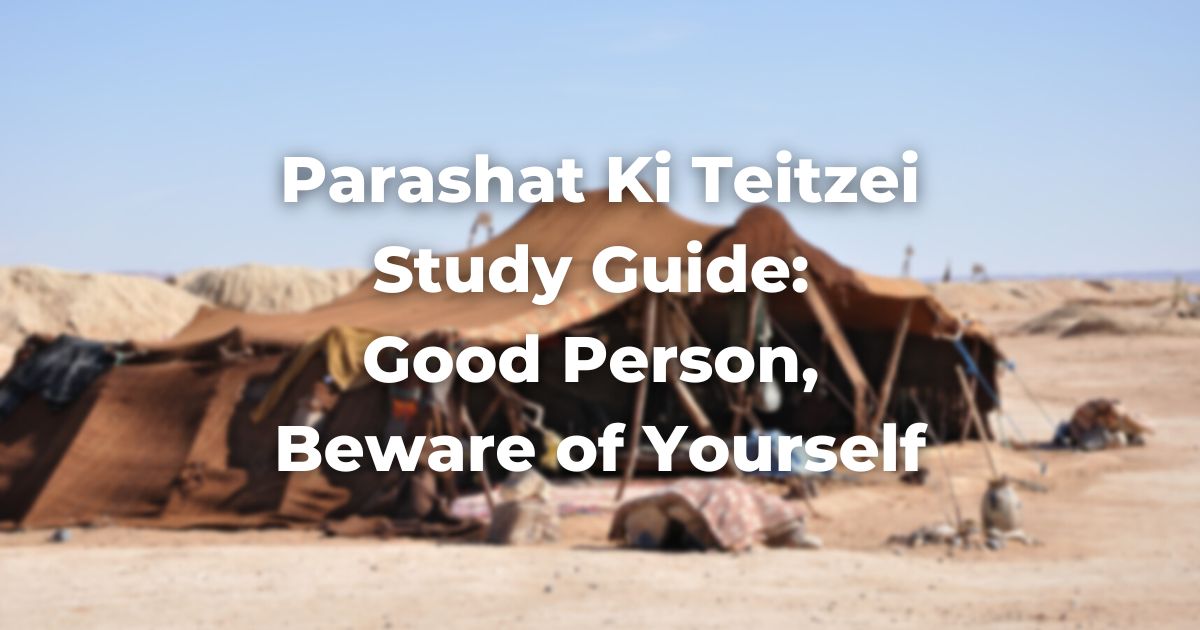Text: Devarim 23:10-15
10 When you go out in a camp against your enemies, then keep yourself from every wicked thing. 11 If there is any man among you who becomes unclean by some occurrence in the night, then he shall go outside the camp. … 13 Also you shall have a place outside the camp, where you may go out; 14 and you shall have an implement among your equipment, and when you sit down outside, you shall dig with it and turn and cover your refuse. 15 For the LORD your God walks in the midst of your camp, to deliver you and give your enemies over to you; therefore, your camp shall be holy, that He may see no unclean thing among you, and turn away from you.
- Unlike many laws where Devarim adds a new detail to a law that appeared earlier in the TorahRefers to the first five books of the Hebrew Bible, the Tanakh, also called the Five Books of Moses, Pentateuch or the Hebrew equivalent, Humash. This is also called the Written Torah. The term may also refer to teachings that expound on Jewish tradition. Read more, the laws of war do not appear in the earlier books of the Torah (despite the Israelites having already battled Amalek and other nations). What might be the reason for this?
- What warnings does the Torah give to a person who finds himself in a military camp?
- What is the reason for these warnings?
- What is the role of verse 10 in this section? (Another rule, a heading, or something else?)
Commentary: Ramban on Devarim 23:10
When you go out in a camp against your enemies, then keep yourself from every wicked thing—The correct interpretation regarding this commandment appears to me that Scripture is warning of a time when sin is rampant. The well-known custom of forces going to war is that they eat all abominable things, rob, plunder, and are not ashamed even of lewdness and all vileness. The fairest of man by nature comes to be possessed of cruelty and fury when the army advances against the enemy. Therefore, Scripture warned, then keep yourself from every wicked thing. And by way of the simple meaning of Scripture, this is an admonition against doing anything forbidden.
- How does Ramban understand the need for verse 10? What is included in it?
- Why is a special warning needed in this situation? What is forbidden is already known!
Commentary: Shadal on Devarim 23:15
Therefore, your camp shall be holy—The main point is to establish in their hearts that the LORD is going before them and the victory is from Him, therefore He commanded that they shall picture the LORD before them always, as if they are in His Temple. But this is not because of the Ark, for mostly it did not go out with them …
- According to Shadal, why does the Torah demand to keep the camp holy? Why does he stress that the Ark is not the reason for the demand for holiness?
- How might viewing the camp as holy affect the people’s behavior?
See more: Parashat Ki Teitzei
Originally posted as part of the Conservative Yeshiva at the Fuchsberg Jerusalem Center’s Torah Sparks. Support Torah learning from the Fuchsberg Jerusalem Center/Conservative Yeshiva for leaders and seekers around the world here.
Authors
-

Vered Hollander-Goldfarb teaches Tanach and Medieval Commentators at the Conservative Yeshiva and is a regular contributor to Torah Sparks, FJC’s weekly message on the weekly Torah portion. She received her M.A. in Judaic Studies and Tanach from the Bernard Revel Graduate School of Yeshiva University and studied at Bar-Ilan University and the Jewish Theological Seminary. Before making aliyah, Vered taught at Ramaz School and Stern College in New York.
View all posts -



The Fuchsberg Jerusalem Center (FJC) is a home in the heart of Jerusalem where leaders and seekers can find an authentic place in Jewish tradition to call their own. FJC offers opportunities to study, pray and explore within an egalitarian and inclusive setting, creating multiple pathways for finding personal and communal meaning.
View all posts






